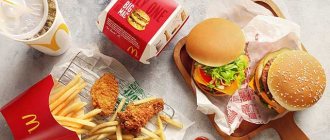Fast food chains do not intend to harm our health at all. Their goal is to make it tasty, beautiful and cheap. Cheap, of course, for them. You should like it and definitely come back. This is business - and nothing extra. But this formula does not contain the word “safe”. Because if you make food safe for the human body, it will cost much more. And this is a different business – a restaurant business. A real one, where there is a chef and sous-chef, where vegetables are bought in the morning at the market, and oysters are brought from France. But such restaurants are not affordable for everyone. Fast food is mass production. And it requires different recipes and ingredients, a different attitude towards products. Do you want fast and cheap? Then see what you get.
©firestock.ru
Salt
Table salt (sodium chloride, NaCl) is vital for humans. It is involved in the production of hydrochloric acid, an important component of gastric juice. Its deficiency, as well as its excess, negatively affects the body. But fast food contains too much salt. For humans, the physiological norm of consumption is five grams of salt per day. So if you take one Big Mac (2.3 grams of salt) and a medium serving of French fries (0.55 grams of salt), that will already be more than half the daily value. If you stop there and don’t over-salt it at home, then good. And if not? What are the dangers of excess salt in the body?
Excess salt leads to high blood pressure (hypertension), and this, accordingly, leads to headaches, pain in the heart, tinnitus, and visual impairment. Salt retains water in the body, which complicates the functioning of the kidneys and heart. Excess salt leads to swelling of the hands and feet. Other adverse effects are excess weight, osteochondrosis, gout, urolithiasis, nephrolithiasis and cholelithiasis.
©firestock.ru
Sugar
While salt has been known to man since ancient times, sugar is a relatively new product. If in the middle of the 19th century the average annual consumption of sugar per person in Europe was 2 kg, then by the beginning of the current century it was already 37 kg. Sugar, or scientifically sucrose, is an artificial product. And although it is made from natural raw materials, this should not mislead you. In the human body, sugar is broken down into glucose and fructose, which immediately enter the blood. However, if glucose is a vital substance for humans, then fructose, according to scientists, has no nutritional value. Although it is twice as sweet as glucose, it is what gives the sweet taste to your favorite foods.
Fructose even poses a serious danger to the body. A study conducted by scientists from the University of California found that fructose can cause diabetes, Alzheimer's disease, attention deficit hyperactivity disorder (ADHD), and various cardiovascular diseases. We must immediately talk about fructose in fruits. This is the same fructose, but it does not enter the body alone, but with cellulose (indigestible fiber). Thanks to her, it bypasses the stomach, is not absorbed into the blood and reaches the large intestine.
Now look at the composition of the Big Mac. The sauce contains high fructose corn syrup. Some time ago, fructose syrup was also included in the list of ingredients for the Big Mac bun. If we talk about sugar in general, it is found in carbonated drinks and cocktails, cakes and ice cream. And excessive consumption of sugar, both glucose and fructose, is a direct path to obesity and diabetes.
©firestock.ru
Facts about fast food
>> The honor of inventing the sandwich goes to John Montague, Earl of Sandwich. Being an avid gambler, the count did not want to tear himself away from the green cloth even to eat. It was he who ordered the cook to put a slice of meat between two pieces of bread so that he could eat and play cards at the same time.
>> American Morgan Spurlock decided to experiment on himself and ate exclusively at McDonald's for a month. As a result, the experimenter gained 12 kg of excess weight, damaged his liver and exceeded the permissible level of cholesterol in the blood. >> On the first day of McDonald's operation in Moscow, about 30 thousand people tried hamburgers.
>> Today, McDonald's restaurants are present in 119 countries around the world.
High calorie content
Another main disadvantage of fast food is its high calorie content and low nutritional value. Calorie content, or otherwise energy value, is one of the most significant characteristics of food products. For each person, the daily calorie intake is individual. It depends on the height, weight, gender and age of the person. Lifestyle plays an important role. Those who lead an active lifestyle need more energy, those who move little need less, and accordingly, the calorie content of the diet will be different. In general, an adult man of average build needs about 2500 Kcal per day, a woman less - only 2000 Kcal.
Excess calorie intake is the main cause of obesity. If you consume more calories than your body can burn, it leads to the formation of fatty tissue. But the danger is not only in high calorie content, but in its carrier. Fast food contains a large amount of light carbohydrates, they are also called fast carbohydrates. They are quickly absorbed by the body, but are not spent on maintaining vital functions, but are put aside “in reserve”. After a while you will get hungry again. Hamburgers and hot dogs contain virtually no complex carbohydrates, which take a long time to digest and provide you with energy relatively evenly throughout the day. Therefore, you will have to eat again to get the energy your body needs.
A research group of scientists from Boston Children's Hospital, led by Dr. David Ludwig, concluded that easily digestible carbohydrates are more dangerous than fat. Food that contains such carbohydrates promotes the production of insulin, which “forces” the body to store fat.
©firestock.ru
Fast food - what is it like?
In English, fast food is translated as “quick food.” Cooking takes a couple of minutes, and the speed of consuming dishes is lightning fast.
Interesting fact. Have you noticed that classical music is played in expensive restaurants, and pop or electronic music is played in eateries? Therein lies the cunning secret. Fast music encourages a person to chew vigorously, so he soon leaves the room. Due to the high traffic volume, the fast food outlet receives a fabulous daily profit.
There are many types of fast food, the most popular of them are the following:
- Hamburgers.
- Sandwiches.
- Hot dogs.
- Pizza.
- Shawarma.
- Breaded chicken meat.
- Fried pies made from yeast dough with filling.
- Pancakes.
- Potato chips and snacks.
- Bread crackers.
- Breakfast cereals: corn sticks and balls, popcorn, cereal flakes.
Why, if fast food is so harmful, do people adore it? What is the secret of such popularity? Cheap, satisfying and able to have a snack on the go. Unfortunately, the love for fast food turns into sad consequences for health.
You may be interested in: The benefits and harms of Coca-Cola for the body of an adult and for children
Fats
Fats are an integral component of our diet and an essential ingredient in cooking. Fats themselves consist of so-called fatty acids, which come in two types - saturated and unsaturated. The former are of animal origin, the latter are of plant origin. Molecules of natural unsaturated fats are in the so-called cis form, they are also called cis fats. You rarely hear about these fats. Their “doubles” are commonly heard – trans fats. They are sometimes, of course, found in nature, but a much larger number of trans fats that enter our body are of artificial origin. They can be found in margarine, spreads, mayonnaise and, of course, in many products from fast food establishments - French fries, hamburgers, pasties, donuts.
Such fats, compared to cis fats, have an irregular molecular shape and are not able to properly perform the functions inherent in fats in the body. At the same time, they are quite attractive to the fast food industry. Fats based on unsaturated fatty acids (and these are usually vegetable oils) have a significant drawback - they are difficult to store. To increase shelf life, a hydrogenation method is used, as a result of which most unsaturated fatty acids are transferred from the cis form to the trans form. Various margarines and hydrogenated oils are produced in this way. They last longer, can be used repeatedly for frying, and are also quite cheap compared to animal fats. That is, they have everything that is needed for use in the fast food industry.
At first, no one noticed the harm from such fats. But already in 1993, studies appeared confirming that eating foods high in trans fats increases the risk of cardiovascular disease. Trans fats behave differently in the body than their natural counterparts. In addition to the heart, trans fats also damage the pancreas - leading to the development of diabetes, as well as the appearance of chronic inflammatory processes.
Consumption of trans fats leads to obesity. At the same time, trans fats are difficult to remove from the body; according to some data, this requires at least 2 years, provided that a healthy diet is maintained during this period.
Don't assume that saturated animal fats are safe. They are also used in abundance in the preparation of fast food. Their excessive consumption creates a huge burden on the liver, negatively affects the heart and leads to obesity.
©hdimagegallery.net
What's the best way to have a snack on the go?
Knowing how fast food is harmful to health, I want to find a worthy alternative to it. I won't advise you to snack on apples or yogurts. A sudden jump from rich food to low-calorie food will only cause irritation.
Fortunately, there are options for delicious, healthy and filling snacks:
- A handful of nuts: hazelnuts, walnuts, cashews, almonds.
- Boiled egg.
- Vegetable smoothie with almond milk and oatmeal.
- Sandwich made from whole grain bread with a slice of hard cheese.
- Unleavened cookies.
- Pumpkin seeds.
- 4-5 pieces of dried apricots, prunes or figs.
- Spiced apple chips.
The foods listed above contain a lot of proteins, “complex” carbohydrates, healthy fats or fiber - components that satisfy hunger for a long time.
You can have a snack at any time of the day, but no later than 2 hours before bedtime .
The insidiousness of fast food is that the negative health consequences do not appear immediately, but after years. When a person is faced with obesity, diabetes, pancreatitis or another disease, he can no longer get rid of the addiction. He knows for sure about the dangers of fast food, but continues to ruin his health. Listen to the advice of experts and avoid junk food outlets.
Taste and aroma
In the process of going through the entire technological chain: long-term storage, freezing and thawing, heat treatment, products lose their natural taste. But you don’t want to buy a bland and tasteless Big Mag, do you? They will make it tasty and aromatic for you.
The main producer of flavors and aromas for the McDonald's fast food restaurant chain is International Flavors & Fragrances. It is thanks to this company, whose headquarters are located in New York, and not to the skillful hands of the chef, that all the food in McDonald's restaurants is so tasty and attractive. The company was founded back in 1833 and deals not only with flavors for the food industry. Among its clients are manufacturers of personal care products, household chemicals, perfumes, and cosmetics.
Food flavorings and flavoring additives can be both natural and synthetic. But artificial ones are cheaper. In general, due to their small amounts, these substances do not pose a major health threat. But in high concentrations and long-term use they can lead to liver disease.
When talking about the taste properties of products, one cannot fail to mention monosodium glutamate. This food additive increases the smell and taste of any dishes and products. Monosodium glutamate was isolated in its pure form in Japan at the beginning of the 19th century. Today it is actively used by fast food manufacturers. It is often hidden in a product called MSG (monosodium glutamate). In addition, it has a European code (number) - E621. Excessive consumption of products containing this food additive can ultimately cause Alzheimer's disease, kidney failure, digestive problems, bronchial asthma, and various allergic reactions. Excess glutamate also affects vision - the structure of the retina is disrupted. And, of course, monosodium glutamate can cause food addiction. A person stops accepting natural food and can no longer do without adding monosodium glutamate to food.
©hdimagegallery.net
Smoothing out the consequences
From all the variety of fast food dishes, it is quite possible to choose those that will cause the least harm. Please note the following recommendations:
- Skip the fries.
- If you want to eat a pie, choose baked rather than fried, it has less fat.
- When buying pizza, choose the one with more vegetables.
- If you have the opportunity to choose the composition yourself, give preference to vegetables, chicken breast or seafood. Avoid mayonnaise and other mayonnaise-based sauces and ketchup.
- Replace sweet soda with tea.
- Visit food service chains no more than once a month.
If you love fast food and notice that something is wrong with your health, contact Diagnoz MC LLC. In our center, you can undergo a bioimpedance measurement procedure (body composition analysis) to determine the percentage composition of muscle tissue, fat and fluid.
Also, a nutritionist will create an individual diet for you, analyze your food diary and give recommendations for the most effective solution to your problem.











